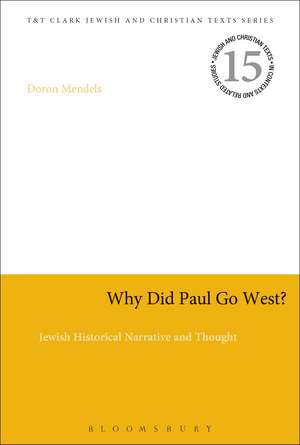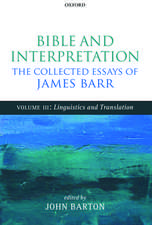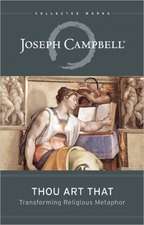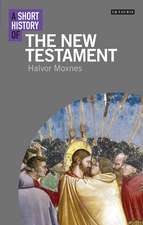Why Did Paul Go West?: Jewish Historical Narrative and Thought: Jewish and Christian Texts
Autor Professor Doron Mendelsen Limba Engleză Paperback – 19 noi 2014
| Toate formatele și edițiile | Preț | Express |
|---|---|---|
| Paperback (1) | 255.76 lei 6-8 săpt. | |
| Bloomsbury Publishing – 19 noi 2014 | 255.76 lei 6-8 săpt. | |
| Hardback (1) | 772.17 lei 6-8 săpt. | |
| Bloomsbury Publishing – 22 mai 2013 | 772.17 lei 6-8 săpt. |
Din seria Jewish and Christian Texts
- 23%
 Preț: 198.12 lei
Preț: 198.12 lei - 22%
 Preț: 237.37 lei
Preț: 237.37 lei - 30%
 Preț: 509.20 lei
Preț: 509.20 lei - 21%
 Preț: 217.53 lei
Preț: 217.53 lei - 21%
 Preț: 228.24 lei
Preț: 228.24 lei - 13%
 Preț: 224.58 lei
Preț: 224.58 lei - 13%
 Preț: 256.77 lei
Preț: 256.77 lei -
 Preț: 257.59 lei
Preț: 257.59 lei - 30%
 Preț: 538.67 lei
Preț: 538.67 lei - 20%
 Preț: 220.75 lei
Preț: 220.75 lei - 31%
 Preț: 891.36 lei
Preț: 891.36 lei - 22%
 Preț: 223.85 lei
Preț: 223.85 lei - 22%
 Preț: 257.59 lei
Preț: 257.59 lei - 20%
 Preț: 219.92 lei
Preț: 219.92 lei - 22%
 Preț: 231.81 lei
Preț: 231.81 lei - 30%
 Preț: 540.65 lei
Preț: 540.65 lei - 22%
 Preț: 256.20 lei
Preț: 256.20 lei - 21%
 Preț: 236.03 lei
Preț: 236.03 lei -
 Preț: 230.98 lei
Preț: 230.98 lei - 31%
 Preț: 948.75 lei
Preț: 948.75 lei - 13%
 Preț: 257.59 lei
Preț: 257.59 lei -
 Preț: 262.54 lei
Preț: 262.54 lei - 21%
 Preț: 217.53 lei
Preț: 217.53 lei - 23%
 Preț: 255.66 lei
Preț: 255.66 lei - 30%
 Preț: 568.71 lei
Preț: 568.71 lei - 31%
 Preț: 1010.06 lei
Preț: 1010.06 lei - 30%
 Preț: 540.80 lei
Preț: 540.80 lei - 22%
 Preț: 230.33 lei
Preț: 230.33 lei - 22%
 Preț: 949.56 lei
Preț: 949.56 lei - 31%
 Preț: 891.10 lei
Preț: 891.10 lei - 31%
 Preț: 890.28 lei
Preț: 890.28 lei
Preț: 255.76 lei
Nou
Puncte Express: 384
Preț estimativ în valută:
48.95€ • 50.91$ • 40.41£
48.95€ • 50.91$ • 40.41£
Carte tipărită la comandă
Livrare economică 14-28 aprilie
Preluare comenzi: 021 569.72.76
Specificații
ISBN-13: 9780567658616
ISBN-10: 0567658619
Pagini: 192
Ilustrații: black & white illustrations
Dimensiuni: 156 x 234 x 10 mm
Greutate: 0.28 kg
Editura: Bloomsbury Publishing
Colecția T&T Clark
Seria Jewish and Christian Texts
Locul publicării:London, United Kingdom
ISBN-10: 0567658619
Pagini: 192
Ilustrații: black & white illustrations
Dimensiuni: 156 x 234 x 10 mm
Greutate: 0.28 kg
Editura: Bloomsbury Publishing
Colecția T&T Clark
Seria Jewish and Christian Texts
Locul publicării:London, United Kingdom
Caracteristici
Provides insights into split in Jewish diaspora, and how this effected the spread of Christianity.
Notă biografică
Doron Mendels is Max and Sophie Mydans Professor in the Humanities at the Department of History at the Hebrew University of Jerusalem, Israel. His recent publications include: Identity, Religion and Historiography and The Media Revolution of Early Christianity.
Cuprins
1. Why Did Paul Go West?2. How Was Antiquity Treated in Societies with a Hellenistic Heritage? And Why Did the Rabbis Avoid Writing History?3. Can We Read a Historical Text as a Musical Score? A New Approach to Polyphony and Simultaneity in 1 Maccabees4. The Conceptual Linearity of Historical Narrative and Its Distortion. A Preliminary Note5. Memory and Memories. The Attitude of 1 and 2 Maccabees toward Hellenization and Hellenism6. Phases of Inscribed Memory Concerning the Land of Israel in Palestinian Judaism of the Second Century BCE. The Case of 1 Maccabees7. Etiquette I: Was the Rejection of Gifts One of the Reasons for the Outbreak of the Maccabean Revolt? A Preliminary Note on the Role of Gifting in the Book of 1 Maccabees8. Etiquette II: Honor and Humiliation as a Factor in Hasmonean Politics According to the Narrator of 1 Maccabees9. Political Theology I: Deus Duplex to Deus Silens. The State of Exception in the Political Theology of 1 Maccabees10. Political Theology II: 1 Maccabees and Liberation from a Competing King-God and the Phenomenon of Rifts Inherent in Ancient IsraelSelected Bibliography
Recenzii
Doron Mendels is one of our finest historians of Judaism in the Hellenistic age. In the series of essays that make up this splendid volume, he offers numerous fresh insights into early Jewish historiography. The essays are notable for their combination of theoretical sophistication and careful textual analysis. The series of studies on the political theology and rhetorical strategies of 1 Maccabees are especially welcome and whet one's appetite for Mendels' forthcoming commentary on this vitally important book.
While Professor Doron Mendels' book Why did Paul go West? focuses on the Hellenistic period, its great interest lies not only in its investigation of the ancient world, but above all in the way in which this investigation is made fruitful for an understanding of current historical and political realities. Indeed, the originality of its contribution is found both in what Doron Mendels terms a "polyphonic reading" of I Maccabees, revealing Hellenistic practices of remembering and reconfiguring (at times subverting) the past, and also in its groundbreaking examination of the deeper implications of this biblical text for an understanding of the modern conception of "political theology." Professor Mendels brilliantly demonstrates how the Hellenistic context of Jewish history, in which God and the prophets no longer seemed to guide the people, clearly foreshadows what 20th century political theory has termed a political "state of exception", thus raising the problem of sovereignty in a way that has lost nothing of its significance for our contemporary world.
Professor Mendels - a prolific scholar of early Judaism and perceptive contributor with new theoretical insights on ancient history - provocatively challenges the Judaism-Hellenism dualism. In recent decades it has been intellectual fashion to deconstruct the time-honoured Judaism-Hellenism dichotomy and to assert that all forms of early Judaism simultaneously were part and parcel of Hellenism. Mendels dissolves the absolute nature of the argument by highlighting the vast differences in terms of Hellenistic influence that existed between various forms of Judaism in the Western and Eastern part of the Roman Empire. The discussion is brought considerably further by nuanced reinstallation of former scholarship's dualism.
The volume by Doron Mendels brings together ten separate yet interconnected essays that examine Jewish narratives ... and thought, centering around the themes of Jewish identity, the role of memory, historiography, gift giving and its relation to honor, and political theology.
Summarized.
While Professor Doron Mendels' book Why did Paul go West? focuses on the Hellenistic period, its great interest lies not only in its investigation of the ancient world, but above all in the way in which this investigation is made fruitful for an understanding of current historical and political realities. Indeed, the originality of its contribution is found both in what Doron Mendels terms a "polyphonic reading" of I Maccabees, revealing Hellenistic practices of remembering and reconfiguring (at times subverting) the past, and also in its groundbreaking examination of the deeper implications of this biblical text for an understanding of the modern conception of "political theology." Professor Mendels brilliantly demonstrates how the Hellenistic context of Jewish history, in which God and the prophets no longer seemed to guide the people, clearly foreshadows what 20th century political theory has termed a political "state of exception", thus raising the problem of sovereignty in a way that has lost nothing of its significance for our contemporary world.
Professor Mendels - a prolific scholar of early Judaism and perceptive contributor with new theoretical insights on ancient history - provocatively challenges the Judaism-Hellenism dualism. In recent decades it has been intellectual fashion to deconstruct the time-honoured Judaism-Hellenism dichotomy and to assert that all forms of early Judaism simultaneously were part and parcel of Hellenism. Mendels dissolves the absolute nature of the argument by highlighting the vast differences in terms of Hellenistic influence that existed between various forms of Judaism in the Western and Eastern part of the Roman Empire. The discussion is brought considerably further by nuanced reinstallation of former scholarship's dualism.
The volume by Doron Mendels brings together ten separate yet interconnected essays that examine Jewish narratives ... and thought, centering around the themes of Jewish identity, the role of memory, historiography, gift giving and its relation to honor, and political theology.
Summarized.















